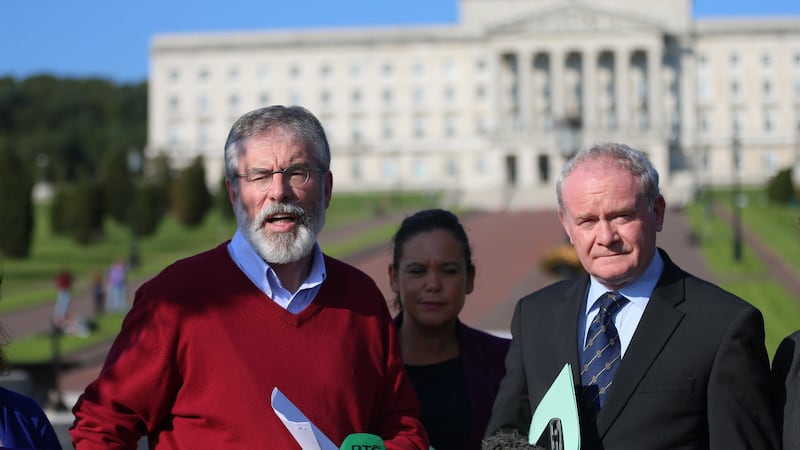IT looks like Martin McGuinness was right and Gerry Adams got it wrong. We are referring, of course, to Sinn Féin's political strategy in response to Westminster's shrinking of the welfare state.
By 2013 Mr McGuinness and the DUP had agreed a number of local protections against Westminster's welfare cuts.
The details were never published, but those with insight into the negotiations suggest that the north would have escaped the worst excesses of Conservative policy.
Political opponents claim that Gerry Adams scuppered this deal, because it undermined the party's opposition to welfare cuts in the Dáil.
Some also say that Sinn Féin expected the return of a British Labour government in 2015, which they believed would have reversed the cuts.
The party denies that Adams pulled the rug from under McGuinness. However, it is clear that its about-turn was not anticipated when McGuinness made the deal.
(At the time, this column argued that the involvement of Mr Adams signalled a cleverer strategy by the party. It was wrong. Subsequent events have shown that it was more hope than strategy.)
Sinn Féin reached a second agreement on welfare last Christmas, when it endorsed the Stormont House Agreement, following what Mr Adams called an "informed discussion" within the party leadership.
It was presumably after an even more informed discussion in March this year that Sinn Féin's erratic leadership took another twist. For the second time, the party walked away from a deal on welfare.
As recently as September, Sinn Féin was promising that no claimant would ever receive a penny less in benefits - a bit like its original "united Ireland or nothing" stance.
In response, Theresa Villiers threatened to return welfare powers to Westminster. Mr McGuinness said that would be a "huge mistake".
Last week, as Mr McGuinness stood applauding the outgoing First Minister on his way to becoming Lord Robinson (of Clontibret?) Theresa Villiers was in Westminster, adopting powers over welfare in the north, with Sinn Féin's support.
(Sinn Féin's performance that day will be a prime contender for the Most Embarrassing Moment of the Year Award. Although it may be beaten by returning welfare powers to Westminster, while promising the electorate, "We will now step up our campaign for the transfer of full economic powers" to the north.)
In what was more fresh-stunt than fresh-start, Sinn Féin settled for £86 million annually over four years "to provide support for those who may have suffered financial loss".
However, it had earlier abandoned the Stormont House Agreement, because it considered the £94 million on offer annually over six years, was insufficient.
This suggests that, like the long war, the long peace is bringing the party to places where it never intended to be.
The longer it supported violence, the more remote a united Ireland became. The longer it resisted welfare cuts, the more it lost.
To facilitate Robinson's party conference, Sinn Féin hastily agreed a compensation package for the proposed cuts to working tax credits, without waiting for the Chancellor's autumn statement a week later.
On Wednesday, the Chancellor abandoned his proposal, leaving the party looking remarkably silly.
Even more irresponsible was its agreement to slash corporation tax here, which will reduce income from London by an estimated £300 million annually.
The claimed payback is 37,500 jobs (what an exact amount) by 2033, eighteen years from now. It is the economic equivalent of selling your cow for five magic beans.
So how will all this impact on the party's election performances, north and south? Ironically, it will suffer least damage in the north, where its about-turns will be most severely felt.
The party will try diversion by wrapping the green flag around itself in its 1916 centenary celebrations. However, People Before Profit should eat into its vote, especially in Belfast.
It appears to have little to fear from the SDLP, which remains eternally ineffective. (Colum Eastwood would need to make an impression soon, if he is not to be accused of rising without trace.)
In the south, other parties can inflict serious damage on Sinn Féin, which is now looking remarkably uncertain in grappling with the responsibilities of government.
The party did not have to be in this position. However, its main mistake was not in switching from the McGuinness deal to the Adams plan.
It was in not incorporating into the Good Friday Agreement strong social and economic safeguards for all the people here.
When your first decision is wrong, all subsequent decisions are a choice between two or more wrongs.
As public spending is reduced even further in the next few years, we can expect many more wrong choices.









